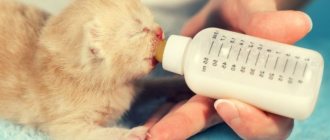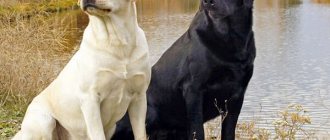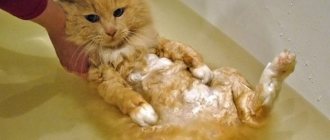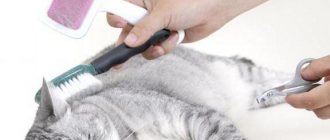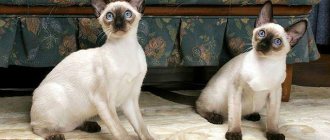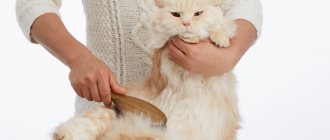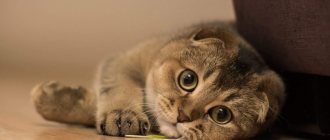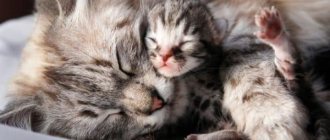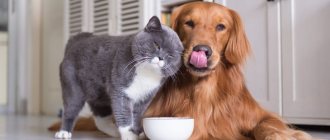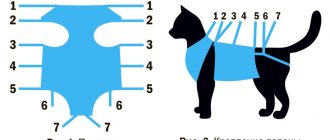Do's and don'ts
- Fact:
Squirrels. They can be both animal and plant. Typically, it is recommended to offer the animal chicken, turkey and beef. All meat should be lean. - Fact 2:
Vegetables. It is advisable to boil them before putting them in a pregnant cat's bowl. - Fact 3:
Fermented milk products. They not only contain calcium, which is important for pregnant cats and embryos - Fact 4:
Egg yolk should be added to the expectant mother's diet once a week
During pregnancy, the body of the expectant mother cat is especially vulnerable, so a properly selected diet is even more important than usual. A carefully adjusted menu structure will provide the necessary nutrients to both the pregnant individual and the embryos. A caring owner of an expectant mother should be aware of which products are not recommended for her and which will bring health benefits.
Needs of a pregnant cat
An absolute requirement is a balanced and varied diet, otherwise the cat will become fat. However, it will not be possible to create a schedule and menu for the entire period of pregnancy, since each stage requires its own approach. The food of any pet must meet quality standards and be at least premium, but in this case the formation of new living organisms in the womb of the female should be taken into account.
So, industrial feed or natural food must contain: vitamin complexes, proteins, minerals, microelements. If previously the cat had enough main meals, then in the new situation it will need complementary foods and snacks. Additional amounts of food should be introduced gradually so that your pet’s stomach does not stretch and excess food does not lead to obesity.
During pregnancy, a cat's energy expenditure increases significantly. One of the most important components is high-quality protein, since protein structures are the foundation for the formation of embryos and the further development of fruits. It is due to protein deficiency that miscarriage, weight loss, and delayed fetal development can occur. There is also a need for amino acids, in particular taurine.
However, you cannot limit yourself to nutrients. An equally important component is minerals. During the formation of the skeleton and muscle tissue of the offspring, the female’s body uses up not only calcium and phosphorus supplied with food, but also accumulated in the body. As a result of a deficiency of these substances, postpartum eclampsia may develop. Therefore, foods containing large amounts of minerals are simply necessary in a cat’s daily diet.
Features of postpartum feeding
Childbirth is quite a serious stress for the animal’s body. On the first day after them, the young mother can refuse to eat at all; there is no need to force her. But she must be provided with plenty of drink, and the liquid consumed must be nutritious.
Warm milk or low-fat meat broth made from beef or chicken would be a good option.
While feeding kittens with milk, the mother feels a lack of calcium, which can lead to a deterioration in the quality of the coat and twitching of the hind limbs. Sometimes, in especially severe cases, acute deficiency can lead to the death of the animal. To avoid such situations, it is worth seeing a veterinarian and, if necessary, receiving appropriate injections. Otherwise, a nursing cat has the same food as a pregnant cat.
© shutterstock
How to make a diet
The nutrition of a pregnant cat should be organized according to a certain scheme so that the pet not only receives all the necessary substances, but also does not suffer from an upset stomach. If before pregnancy the pet was fed industrial food, then during this period it can be diluted with natural food, for example, dairy products, eggs, etc. should be included in the diet. The food should be super premium, intended for a pregnant or lactating cat, a veterinary line or holistic.
Manufacturers of high-quality feed include antioxidants and biologically active complexes in their diets, which contribute to the regulation of hormonal levels and the optimal functioning of the reproductive system. Those who feed natural food should add nutritional supplements to the menu, since it is unlikely that it will be possible to ensure the presence of all the necessary nutrients. These supplements can be purchased at a pet store or veterinary clinic.
The main requirement for the composition is the presence of proteins, taurine, fatty acids, calcium, phosphorus, vitamins A, B and D, iron and copper. Copper and iron must be supplied to the body in sufficient quantities, but not in excess, otherwise constipation may occur.
As for natural products, the diet should include:
- boiled dietary meats;
- rarely - boiled sea fish, fatty meat broths;
- boiled chicken or quail eggs no more than twice a week;
- low-fat dairy products (up to 15%): cottage cheese, kefir, milk (if the cat is not intolerant), yoghurts (without additives), yogurt;
- vegetables and fruits, raw and boiled, to the pet’s taste;
- cereals (rice, buckwheat, oatmeal);
- variably boiled cartilage, jellies.
For constipation, it is better to do without medications and add foods to your diet that promote digestion: beets, butter.
During this period, the use of any medications should be excluded or minimized.
Anthelmintics, anti-parasite medications, and vaccinations are excluded.
Also, when prescribing treatment, if necessary, antibiotics and hormonal drugs should not be prescribed. The main rule: you cannot skimp on food for a pregnant cat. It must be remembered that all foods that are prohibited for consumption in normal conditions (fatty, sweet, spicy, salty, etc.) should also be excluded.
Vitamins and vitamin supplements
If a pregnant animal eats ready-made food, there is no need to take additional vitamins, because they are contained in sufficient quantities in the food. But if the pet is fed natural food, it needs to receive vitamins for pregnant cats and minerals as complementary food.
On the issue of supplementary feeding with useful substances, the best thing to do would be to consult an experienced veterinarian.
He will ask you to tell us what you are currently feeding your pet, examine the state of her body, and only then will he be able to advise whether additional vitamins need to be given or whether this is not necessary.
A deficiency, as well as an excess of vitamins, cannot have a good effect on the condition of the animal. Therefore, it is not recommended to buy vitamins and various nutritional supplements for your animal yourself.
© shutterstock
Organization of diet
Feeding your pet should correspond to the period of pregnancy. Typically, it is divided into three main stages:
- The first three weeks. Appetite increases every day, but portions should increase gradually, daily by 10% of the usual norm. It is important to avoid overfeeding, especially if your pet is a breed prone to obesity.
- Fourth week and until about the second week of next month. The amount of the required daily norm is doubled, but not due to an increase in portions, but due to the number of meals.
- Last weeks of pregnancy. Appetite decreases and so does the need for large amounts of food. By this stage, the fruits are fully formed, gain weight and put pressure on the organs of the digestive tract.
- You need to feed your pet at will, without forcing it. But make sure that you eat enough food.
- The required daily intake should be divided into 5 main meals. Improper nutrition for a pregnant pet threatens not only the health and development of the offspring, but also the cat itself.
- Depletion and loss of reserves of vital nutrients, anemia, hormonal disorders - this is not the entire list of possible health problems for the female. If you care about the health of your pet and want strong, healthy offspring, then start proper care even before mating.
Features of the diet at different stages of gestation
During the first two weeks, it is correct to feed a pregnant cat only 10 percent more than usual. It is important to remember that it is not the amount of feed that is increased, but the frequency of feedings . This will make it possible to reduce the risk of obesity in the animal, which can lead to a difficult birth. Don’t forget that your pet moves much less and sleeps more and more.
By the end of the first trimester, it is recommended that pregnant cats increase their diet by another 50 percent. Considering the individuality of each organism, it is worth listening to the needs of the cat; she herself will tell you how much and when she needs to eat.
Often, at the beginning of the last trimester, cats begin to eat little. This is due to the fact that there is less and less space left in the abdominal cavity for the usual volume of food, because the kittens are actively growing.
A few days before giving birth, caring owners worry that the cat has refused to eat at all. There is no need to worry, this is how her body reacts to the upcoming event.
Video “What to feed a pregnant cat”
From this video you will learn what to feed a pregnant cat.
Recommended Posts
Standard height and weight of the Cane Corso breed by month
Weight of a puppy and an adult Labrador by month
Weight and height of a German Shepherd puppy by month
Description and content of the hunting border terrier
Description and care of the highly intelligent Border Collie breed
Description of forms and features of treatment of enteritis in cats
Features of metabolic processes
Pregnancy is accompanied by an increase in the animal’s body weight, on average by 10-20%. If at first the weight gain is not great, then by the end of pregnancy the weight increases rapidly. At the same time, not only the embryos are enlarged, but also the process of storing nutrients necessary for the subsequent feeding period of newborn kittens is accelerated. These reserves play an important role in milk production and its nutritional value.
The process of deposition (deposition) of mineral components in the body of the fetus and female begins from the end of the 1st - beginning of the 2nd week of pregnancy. Naturally, the need for energy-rich food increases. Energy is now spent not only on maintaining the life support systems of the mother cat, but also on the formation of constantly growing organisms inside her.
Energy expenditures at the beginning of a cat’s pregnancy increase by 1.2-1.5 times, and from the middle to delivery – by 1.5-2 times, compared to basic expenditures. All organs work under load, especially the heart. After all, he has to pump a blood volume that has increased by 40%. This need increases in the first half by 0.5-1 times, and in the second half of pregnancy by almost 2 times.
At week 3, the cat needs 50% more food than before pregnancy. But overfeeding threatens labor complications and the development of very large kittens.
From the 7th week, the female begins to eat less, since the enlarged uterus puts pressure on the intestines, and it is harmful for the cat to increase the amount of food. A larger volume must be divided into more servings. From the 3rd week of pregnancy, the frequency of feedings should be increased to 3 times, and from the 7th week - to 4-5 times.
Before giving birth, the animal may lose its appetite - this is a sure sign of impending birth. You should not force your cat to eat if it refuses. It is enough to give her water and a decoction of raspberry leaves, 1 tsp each. 2 times a day. Increased nutrition is also necessary during lactation.
Protein requirements
During the gestation period, a cat's body requires a high protein content in its food. They are the building material of fetal cells, the building of the immune system in kittens and its normal functioning in cats.
Proteins bind and neutralize toxic components, which is extremely important for preventing late toxicosis. Some hormones are also of protein origin. These include hormones necessary for the normal course of pregnancy, such as:
- gonadotropin-releasing hormone, which regulates the synthesis of follicle-stimulating and luteinizing hormones. Without them, fertilization and conception are impossible;
- somatotropin – a hormone responsible for the growth of the body and regulating the absorption of calcium by bone tissue;
- placental lactogen and 9 more placental hormones;
- prolactin – increases the number of lobules in the mammary gland and is responsible for the production of colostrum and milk.
Equally important to the body are enzyme proteins that regulate all biochemical processes. Even non-pregnant cats need 3 times more protein than dogs, for example. Their body cannot, like a dog’s, reduce the need for protein if it is insufficiently supplied from food. Enzymes begin to decompose liver tissue - the cat and kittens may die.
To fully cover the animal’s protein needs, the diet should include:
- lean poultry (chicken, turkey), beef. The meat must be boiled and cut into small pieces. Its content in the daily diet should be up to 50%;
- by-products of the first category, chicken or beef - heart, lungs, liver, kidneys. It is better to boil or freeze and then scald with boiling water;
- fish – boiled white sea fish fillet;
- chicken egg yolk - raw or boiled;
- fermented milk products - natural yogurt, low-fat kefir, sour cream, cottage cheese, hard cheese.
Only meat is a source of essential amino acids - cystine, taurine, methionine. Their deficiency threatens miscarriage or death of kittens in the womb.
Carbohydrate metabolism
To provide energy processes in a cat's body, carbohydrates are needed. Starch and sugar are quickly digestible carbohydrates. They are rich in cereals, fruits and some vegetables. But their content in the cat’s menu should be strictly dosed.
In order not to cause obesity, it is recommended to cook porridge in water from buckwheat and rice, and steam Hercules flakes. Cats are not particularly keen on eating grains and vegetables, so they need to be mixed with meat to make the healthy dish attractive.
Lipid metabolism
The energy content of the menu can be increased by adding fat. They are more preferable than carbohydrates, since they do not dissolve in biological fluids and do not enter into chemical reactions with them. They are also necessary for developing kittens:
- fats are part of cell membranes;
- isolate nerve fibers;
- retain fat-soluble vitamins.
During pregnancy, they actively accumulate in the placenta, adrenal glands, mammary glands (preparation for lactation) and fetal tissues. A pregnant cat needs vegetable fats to normalize bowel movements. For constipation, just add 1 tsp to porridge or vegetable puree. vegetable oil, and the problem will be eliminated. Fats in a cat's diet should be 15-20%.
Vitamins and minerals
Macro- and microelements are necessary for the cat and her offspring. The need for minerals during this period increases by 20-30%, and during feeding of kittens - by 2-3 times. The animal's diet should be enriched with:
- phosphorus for the formation of the brain, circulatory system and skeleton of the embryo;
- calcium, used for bone mineralization;
- iron, required to increase the amount of hemoglobin and the synthesis of additional blood volume, the formation and functioning of the placenta, the full development of embryos, the preparation of muscles for labor, and then for lactation.
The body of a mother cat and growing kittens needs cobalt, copper, sodium, potassium, and magnesium. For a normal pregnancy you need vitamins:
- C – its need increases 2-3 times, since it is required for the development of the fertilized egg;
- A – for fetal cell division;
- Groups B. For example, thiamine is necessary for the formation of the fetal central nervous system and the normal course of enzymatic processes;
- D – for the prevention of skeletal abnormalities in kittens;
- E – for the functioning of the placenta. With its deficiency, necrotic processes occur in it, and the fetus dies.
You cannot give vitamins and minerals on your own. They are prescribed by a veterinarian, calculating the dosage taking into account the breed, age of the animal, gestational age and number of embryos.
An overdose is just as dangerous as a lack of substances.
There are ready-made vitamin and mineral supplements for pregnant cats on sale:
- Canvit Nutrimin Cat;
- Canina Cat Mineral Tabs;
- Farmavit Neo;
- Beaphar Irish Cal;
- Canina Petvital Biotin Tabs;
- Nutri-Vet Wild Alaskan salmon oil for cats;
- VitamAll Calcium +;
- Radostin.
These complexes are also necessary for cats during lactation. For the normal course of metabolic processes, avoiding constipation, and removing toxins from the body, animals need water. It should always be freely available and in sufficient quantities. Increased absorption of minerals also requires compliance with the drinking regime. Without it, nutrients and water-soluble vitamins will not be absorbed.

